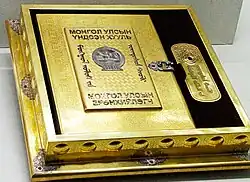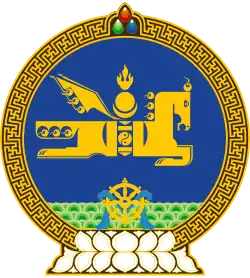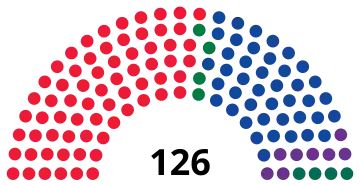Constitution of Mongolia
| Constitution of Mongolia | |
|---|---|
 Original copy of the 1992 Constitution | |
| Overview | |
| Original title | Монгол Улсын Үндсэн Хууль |
| Jurisdiction | Mongolia |
| Ratified | 13 January 1992 |
| Date effective | 12 February 1992 |
| System | Unitary semi-presidential constitutional republic |
| Government structure | |
| Branches | Three |
| Head of state | President |
| Chambers | Unicameral (State Great Khural) |
| Executive | Prime Minister led cabinet |
| Judiciary | Constitutional Court Supreme Court |
| Federalism | No |
| Electoral college | No |
| History | |
| First legislature | 20 July 1992[1] |
| First executive | 6 June 1993 (President) 21 July 1992 (PM) |
| Amendments | 4 |
| Last amended | 31 May 2023 |
| Location | Ulaanbaatar |
| Commissioned by | People's Great Khural |
| Supersedes | Constitution of the Mongolian People's Republic |
 |
|---|
|
|
The current Constitution of Mongolia[a] was adopted on 13 January 1992, put into force on 12 February, with amendments made in 1999, 2000, 2019[2], 2022 and 2023.[3] The constitution established a representative democracy in Mongolia, enshrining core functions of the government, including the separation of powers and election cycle, and guaranteeing human rights including freedom of religion, travel, expression, private property. The document was written after the Mongolian Revolution of 1990, effectively dissolving the Mongolian People's Republic and ending the one party rule.
It consists of a preamble followed by six chapters divided into seventy articles.[4] It is heavily inspired by Western liberal democracies, evident in its protection of minority rights, freedom of expression and assembly and multi-party parliamentary system.
Constitutional history
After the 1921 Revolution that overthrew the Buddhist theocratic khanate, the first codified constitution was introduced in 1924 with the creation of the Mongolian People's Republic.
A second constitution was adopted on June 1940 during the leadership of premier Khorloogiin Choibalsan. The 1940 constitution took the 1936 Soviet Constitution as its model.[5] Elections were restricted—"enemies of the regime" could not vote—and indirect; lower bodies elected higher levels[6] but constitutional amendments after 1944 changed the system.
In 1951, the presidium of the MPR, the Little Khural was abolished and its functions were transferred to the existing State Great Khural, which was renamed to the People's Great Khural.[7]

On July 1960, a third constitution was adopted by the People's Great Khural.
In the aftermath of the 1990 Democratic Revolution, a fourth constitution was ratified on 13 January 1992. It transitioned the country from a socialist party state to a unitary parliamentary sovereign republic. The 1992 constitution dissolved the People's Great Khural (upper house) and the Baga Khural (lower house), restructured the legislative branch of government and ultimately created a new unicameral legislature, the State Great Khural. The official name of Mongolia was changed from the Mongolian People's Republic to Mongolia. A new state flag, emblem and anthem were adopted.[8]
Contents
Chapter one declares the sovereignty and territorial integrity of the state, defines the relationship between religion and state, and defines Mongolian emblem, flag and anthem.[9]
Chapter two specifies the civil, political and inalienable rights of the individual: freedom of speech, of religion, of expression, of the press, the right to vote, equality before the law, the right to government-provided health care, education and intellectual property. It also lists duties of the citizen, including paying taxes and serving in the armed forces.[10] While chapter three defines the structure of the legal system, the form of the republic, and the structure of the government, chapter four codifies the administrative districts of Mongolia and describes the relationship between national and local government. Chapter five establishes a Constitutional Court to make rulings on the interpretation of the constitution, while chapter six describes the amendment process for changing it.[10]
Amendments
Amendments of 2019
In 2019, Mongolia amended its constitution strengthening the powers of the prime minister in a bid to end years of political instability and economic stagnation.[2] With the amendments, presidential term was also shortened to a single 6-year term.[11][12] The amendments in the constitution were supposed to enhance the economic opportunities of the Mongolian citizenry and give them better control over how the country's vast natural resources and the revenues earned from them are maintained. Furthermore, the amendments increased the independence of the judiciary by stripping the president of his power to appoint judges in key posts, and establish parliamentary rather than executive oversight over judicial matters. The amendments featured vigorous participation of ordinary people as well as incumbent politicians.[13] Proportional representation as a system to elect lawmakers were rejected, though the constitutional changes guaranteed that election laws are not changed a year before polls are held.[14]
Amendments of 2022
In 2022, the Constitutional Court found some of the articles that were amended in 2019 were conflicting with other articles of the constitution.[15] The following amended paragraph in the constitutional provision of Article 39.1: "...The Prime Minister and no more than four members of the Government may hold concurrently position of the Member of the State Great Khural." was invalidated by a constitutional amendment on August 25, 2022.[16]
Amendments of 2023
On May 31, 2023, a constitutional amendment that increased the number of seats from 76 to 126 and changed the electoral system from a majoritarian plurality-at-large voting to a mixed proportional system, where 78 members were to be elected by a multiple non-transferable vote in multi-member constituencies and 48 by a closed list proportional representation.[17] Proportional party voting method was re-introduced.[18]
See also
- Constitutionalism
- Politics of Mongolia
- State Great Khural
- President of Mongolia
- Prime Minister of Mongolia
Notes
References
- ^ "Өнөөдөр-Монгол Улсын Их Хурал үйл ажиллагаагаа эхэлсэн өдөр тохиож байна | Мэдээллийн дэлгэрэнгүй | Parliament". Archived from the original on 23 August 2017. Retrieved 21 May 2020.
- ^ a b "Mongolia amends constitution in bid to end political instability". Reuters. 16 November 2019. Retrieved 13 January 2020.
- ^ Adiya, Amar (25 July 2023). "How is Mongolia Addressing Concerns Over Foreign Meddling in Elections?". Mongolia Weekly. Retrieved 5 July 2024.
- ^ Montsame News Agency. Mongolia. 2006, ISBN 99929-0-627-8, p. 38
- ^ Ristaino, Marcia R. (1991). "Constitutional Framework". In Worden, Robert L.; Savada, Andrea Matles (eds.). Mongolia: a country study (2nd ed.). Washington, D.C.: Federal Research Division, Library of Congress. pp. 175–178. ISBN 0-16-029462-2. OCLC 21600294.
 This article incorporates text from this source, which is in the public domain.
This article incorporates text from this source, which is in the public domain.{{cite encyclopedia}}: CS1 maint: postscript (link) - ^ Ristaino, Marcia R. (1991). "Constitutional Framework". In Worden, Robert L.; Savada, Andrea Matles (eds.). Mongolia: a country study (2nd ed.). Washington, D.C.: Federal Research Division, Library of Congress. pp. 175–178. ISBN 0-16-029462-2. OCLC 21600294.
 This article incorporates text from this source, which is in the public domain.
This article incorporates text from this source, which is in the public domain.{{cite encyclopedia}}: CS1 maint: postscript (link) - ^ Alan J. K. Sanders (ed.), "Hural, Little" and "Hural, State Little", in Historical Dictionary of Mongolia, 2nd ed. (Scarecrow Press, 2003), p. 162.
- ^ iKon.mn, А. Төгөлдөр (13 January 2025). "1992 оноос хойш дөрвөн удаа Үндсэн хуульд өөрчлөлт оруулжээ". ikon.mn (in Mongolian). Retrieved 1 August 2025.
- ^ Montsame News Agency. Mongolia. 2006, ISBN 99929-0-627-8, p. 38-39
- ^ a b Montsame News Agency. Mongolia. 2006, ISBN 99929-0-627-8, p. 39
- ^ "Preserving the political status quo in Mongolia". East Asia Forum. 10 January 2020. Retrieved 13 January 2020.
- ^ "Welcome to President Battulga's rule in 2020s". Mongolia Weekly. 5 January 2020. Retrieved 13 January 2020.
- ^ "Mongolia's long,participatory route to constitutional reforms".
- ^ "Mongolia amends constitution in bid to amend political instability". Reuters. 16 November 2019.
- ^ iKon.mn, А. Төгөлдөр (24 August 2022). "Монгол Улсын Үндсэн хуульд нэмэлт, өөрчлөлт оруулах журмын тухай хуульд нэмэлт оруулах тухай хуулийн төслийг өргөн мэдүүлэв". ikon.mn (in Mongolian). Retrieved 1 August 2025.
- ^ "МОНГОЛ УЛСЫН ҮНДСЭН ХУУЛЬ". Эрх зүйн мэдээллийн нэгдсэн систем. Retrieved 1 August 2025.
- ^ "Parliamentary Elections 2024: Yet Another New Election System | Mongolia Focus". Retrieved 1 August 2025.
- ^ "Concerns Over Foreign Meddling Rise in Mongolia's Elections". Mongolia Weekly. 25 July 2023. Retrieved 25 July 2023.
Further reading
- S. Narangerel, Legal System of Mongolia, Interpress, 2004
External links
- "МОНГОЛ УЛСЫН ҮНДСЭН ХУУЛЬ". Эрх зүйн мэдээллийн нэгдсэн систем.
- Mongolia's Constitution of 1992 with Amendments through 2001
- Text of the constitution of Mongolia in English

